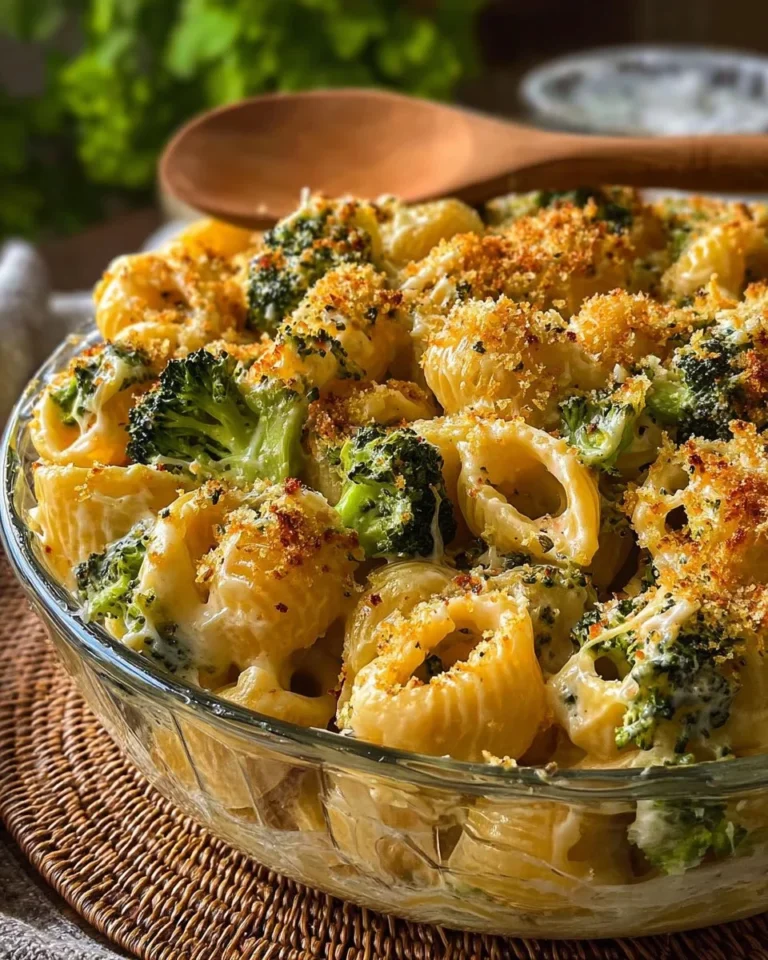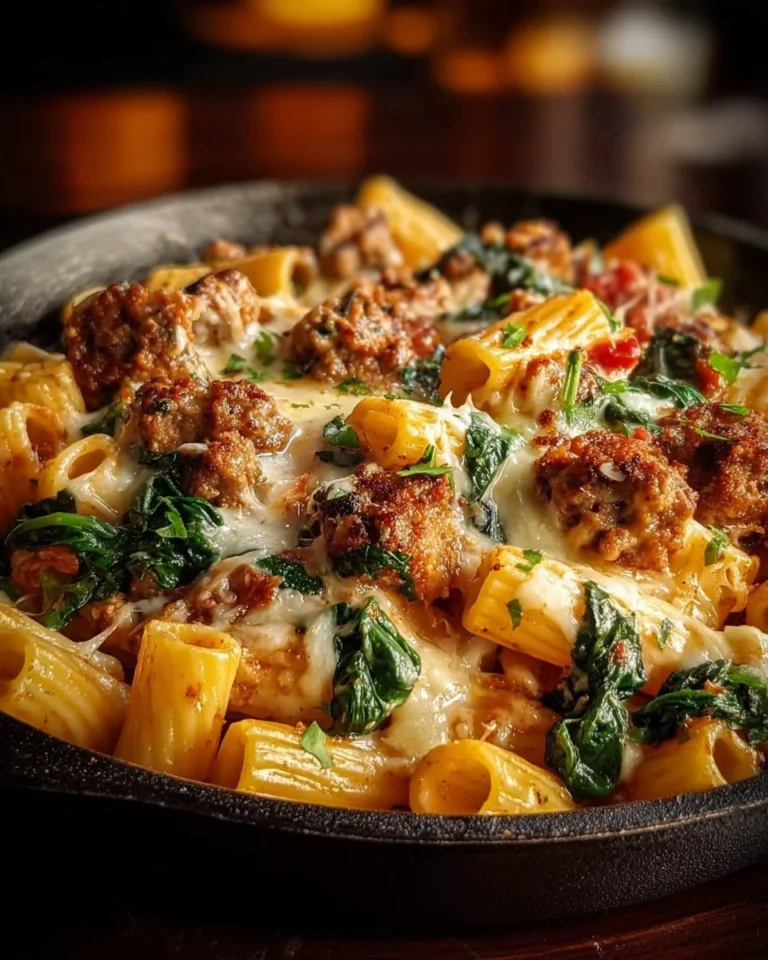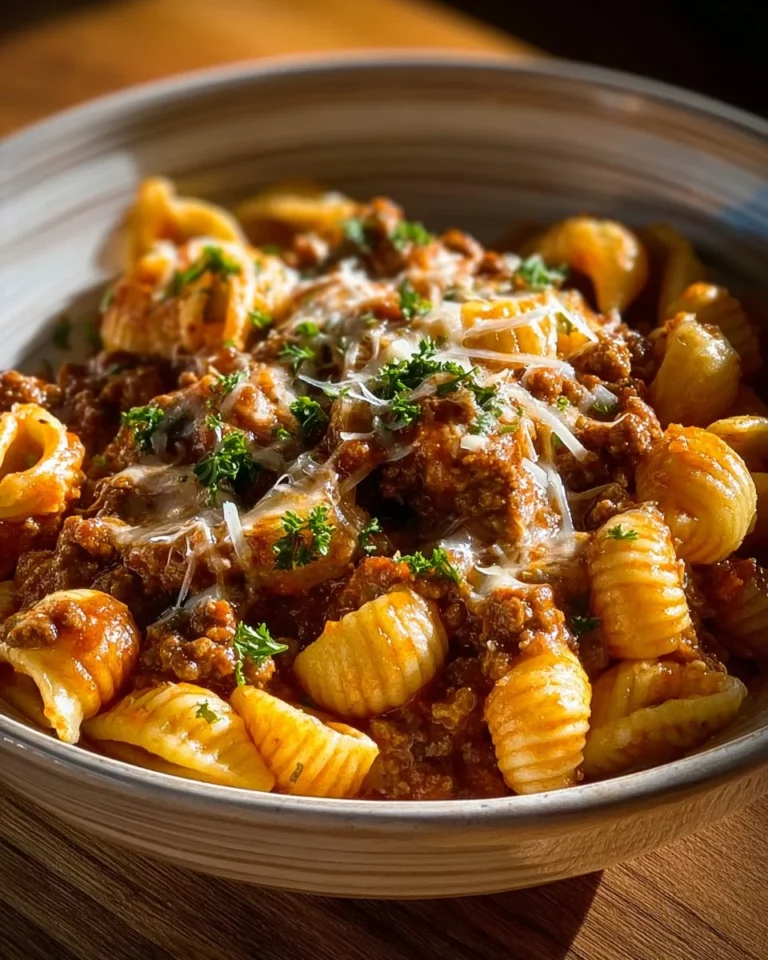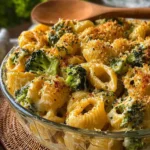Imagine walking into your kitchen, where the rich aroma of stir-fried noodles fills the air. It brings back memories of shared meals and laughter with family and friends. Hokkien noodles are more than just a dish; they are a canvas for creativity and a gateway to cultural heritage.
Whether it’s your first time cooking or you’re a seasoned chef, this guide will help you. It will make every experience flavorful and fulfilling. Get ready to explore the heart of this beloved dish and create lasting memories around your table.
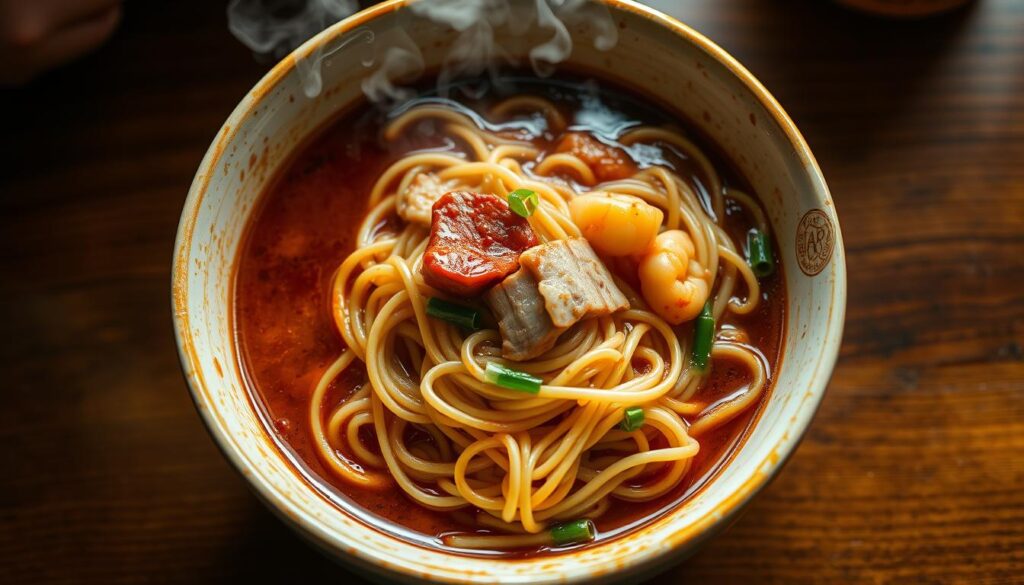
Table of Contents
Key Takeaways
- Discover the origins and cultural significance of Hokkien noodles.
- Learn the difference between Hokkien noodles and other types of noodles.
- Identify key ingredients needed for an authentic Hokkien noodles recipe.
- Follow a detailed step-by-step guide to preparing the dish.
- Explore variations, including vegetarian and protein-rich options.
- Understand the health benefits of this delicious noodle dish.
Introduction to Hokkien Noodles
Hokkien noodles come from the Fujian province of China. They are loved across Southeast Asia for their thick, chewy texture and yellow color from eggs. These noodles are a key part of many Asian-inspired dishes, making them a favorite for cooking.
Hokkien noodles are great in many recipes, from stir-fries to soups. They soak up flavors well, making every bite enjoyable. Exploring how to make hokkien noodles opens up a world of Asian flavors and cooking techniques.
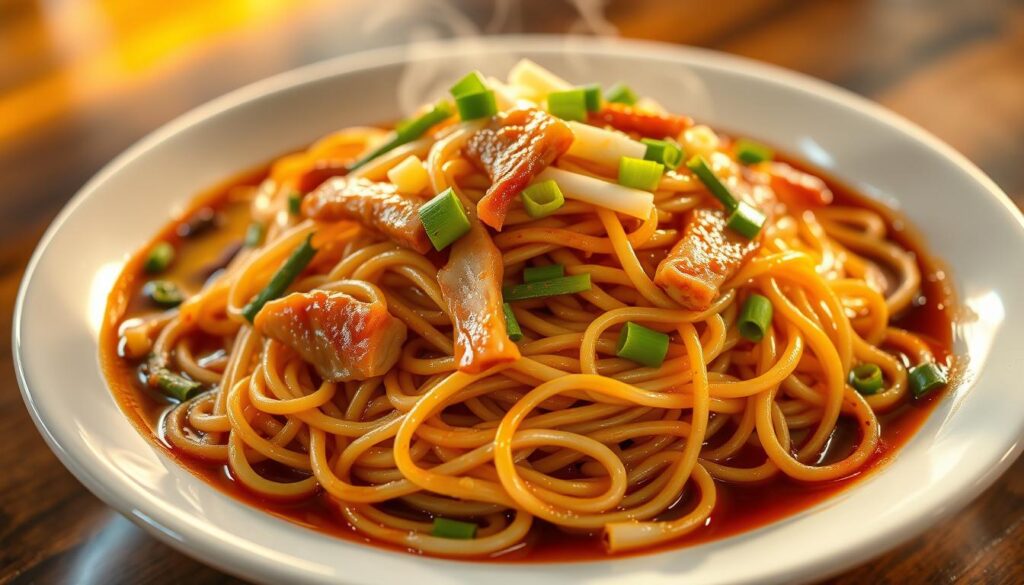
What Are Hokkien Noodles?
Hokkien noodles are a tasty addition to Asian cuisine. They have a unique texture and flavor that many love. Knowing where they come from and their cultural importance makes them even more special.
Origin and Cultural Significance
Hokkien noodles come from China’s coastal areas, home to the Hokkien people. They are a key part of many traditional dishes. They also play a big role in festivals and family gatherings.
These noodles bring families closer to their cultural heritage. They are often at the center of special meals. This shows the love and effort put into every dish.
Differences Between Hokkien Noodles and Other Types of Noodles
Hokkien noodles are thick and chewy, unlike other Asian noodles. They are not as light as rice noodles. They can handle stir-frying and sauces well.
Wheat noodles are different in taste and cooking. Hokkien noodles are great for hearty meals. They are a favorite for those who enjoy filling dishes.
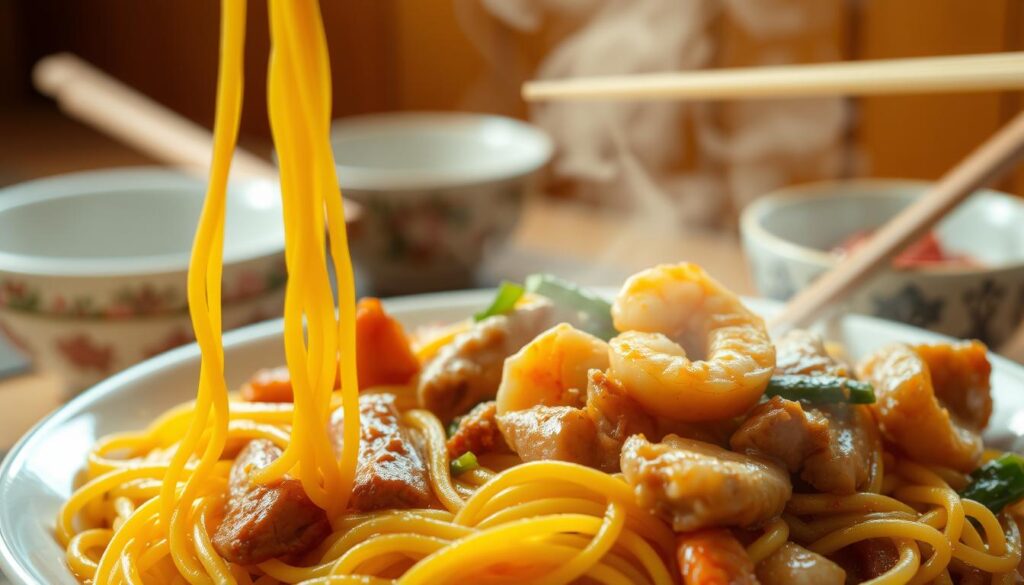
Key Ingredients for Authentic Hokkien Noodles
To make authentic Hokkien noodles, you need the right ingredients. Each part is key to getting the flavor and texture just right. This guide helps you pick the best ingredients, making your dish truly special.
Choosing the Right Noodles
The noodles are the heart of your dish. They should be chewy and flavorful. For the best taste, choose fresh or frozen noodles from an Asian market. Dried noodles are okay too, but follow the cooking instructions to keep their texture.
Essential Sauces and Seasonings
A great noodle sauce needs the right mix of sauces. Soy sauce, oyster sauce, and fish sauce add depth. Add a bit of sesame oil for extra richness. Trying different mixes lets you tailor the sauce to your taste while keeping it traditional.
Fresh Vegetables and Proteins
Add fresh veggies like bean sprouts, scallions, and Bok Choy for crunch and color. Use proteins like prawns, chicken, or tofu for nutrition. These ingredients not only taste great but also make your meal healthier.
Step-by-Step Guide to Making Hokkien Noodles
Making perfect hokkien noodles needs good planning and skill. This guide will show you how to prepare each ingredient right. This way, you’ll get a dish that tastes great and looks good too.
Preparation of Ingredients
First, get all your ingredients ready. Good preparation is key to a great hokkien noodles dish. Here’s what to do:
- Soak the hokkien noodles in warm water for about 30 minutes until they are tender.
- Rinse the noodles in cold water and drain to prevent sticking.
- Chop your chosen vegetables, ensuring a mix of textures and colors for visual appeal.
- Prepare proteins like chicken, shrimp, or tofu by slicing them into bite-sized pieces.
Cooking Techniques & Tips for Perfect Noodles
Now that your ingredients are ready, it’s time to cook. Here are the steps to stir-fry like a pro:
- Heat your wok over medium-high heat until it starts to smoke slightly; this will ensure you achieve a perfect stir-fry.
- Add a tablespoon of oil to the hot wok, swirling it around to coat the surface evenly.
- Begin adding your proteins, cooking until they are browned and cooked through.
- Next, toss in the vegetables and stir-fry for 2-3 minutes until they are tender-crisp.
- Then, add the soaked hokkien noodles along with sauces like soy sauce or oyster sauce, stirring to combine all ingredients smoothly.
- Cook for another 2-3 minutes to allow the flavors to meld and the noodles to heat through.
Watch the timing closely to keep the noodles right. This mix of prep and cooking will make your hokkien noodles dish tasty and pretty.
Delicious Hokkien Noodles Recipe
Making Hokkien noodles at home is simple. This recipe is great for both new and seasoned cooks. It promises a tasty dish every time. You’ll find a detailed list of ingredients and easy steps to follow.
Ingredient List for Hokkien Noodles
| Ingredient | Quantity |
|---|---|
| Hokkien noodles | 14 oz |
| Vegetable oil | 2 tbsp |
| Garlic (minced) | 2 cloves |
| Bell pepper (sliced) | 1 medium |
| Carrot (julienned) | 1 medium |
| Green onions (sliced) | 3 stalks |
| Soy sauce | 3 tbsp |
| Oyster sauce | 2 tbsp |
| Protein of your choice (chicken, shrimp, tofu) | 8 oz |
Directions to Prepare the Dish
- First, cook the hokkien noodles as the package says. Drain and keep aside.
- Heat vegetable oil in a big skillet or wok over medium heat. Add minced garlic and cook until it smells good, about 30 seconds.
- Put your chosen protein in the skillet and stir-fry until it’s fully cooked.
- Add sliced bell pepper and julienned carrot. Cook for 2-3 minutes more until they’re soft.
- Put the cooked noodles in the skillet, then add soy sauce and oyster sauce. Mix everything well until it’s hot and combined.
- Top with green onions and serve hot.
Variations of Hokkien Noodles
Hokkien noodles are versatile, fitting many diets while keeping their true taste. You can make tasty vegetarian noodle dishes by using vegetables or tofu instead of meat. This way, you keep the flavor and meet the needs of those who eat plants.
For those who like more substance, adding chicken or seafood brings extra nutrition and new flavors to the dish.
Vegetarian Versions of Hokkien Noodles
Making Hokkien noodles vegetarian is simple and rewarding. Adding mushrooms, bell peppers, and broccoli gives them more depth and texture. Tofu is a great protein, soaking up the sauces and making the meal filling.
Some favorite vegetarian noodle recipes include:
- Stir-fried Hokkien noodles with mixed vegetables and tofu
- Hokkien noodles in sesame sauce topped with steamed broccoli
- Spicy Hokkien noodle salad featuring cucumber and carrots
Poultry and Seafood Additions
Adding poultry or seafood can make your Hokkien noodles even better. These ingredients add more taste and nutrients. Here are some tasty options:
- Chicken stir-fry with Hokkien noodles, garlic, and soy sauce
- Shrimp Hokkien noodles tossed with ginger and scallions
- Duck Hokkien noodle soup with bok choy and mushrooms
Serving Suggestions for Hokkien Noodles
Make your meal special with these serving ideas for Hokkien noodles. Start by adding fresh scallions, cilantro, or a squeeze of lime. These add flavor and make your dish look great.
Pair your noodles with tasty side dishes. Spring rolls add a nice crunch. Try an Asian salad with crunchy veggies and a tangy dressing. These sides make your noodles the star of the show.
For a spicy twist, offer dipping sauces on the side. It lets everyone customize their meal. These tips turn a basic meal into a memorable experience.
Combining Hokkien Noodles with Other Dishes
Exploring Hokkien noodles opens up endless flavor combinations. Pairing them with other dishes creates a dynamic dining experience. The key is to choose sides that enhance the noodles’ rich flavors. Look for options that add texture and balance.
Pairing with Asian-Inspired Sides
Asian-inspired sides offer a variety of flavors and textures that complement Hokkien noodles beautifully. You might try pairing with:
- Steamed dumplings filled with pork or vegetables
- Stir-fried bok choy for a fresh crunch
- Spring rolls packed with fresh herbs and veggies
- Szechuan green beans for a spicy kick
These sides not only enhance the main dish but also create a balanced meal. They celebrate the richness of Southeast Asian cuisine.
Serving with Asian Dipping Sauces
No meal is complete without the right dipping sauces. Dipping sauces add layers of flavor. Consider these options when serving your Hokkien noodles:
- Soy sauce for a classic flavor
- Chili oil for those who enjoy heat
- Hoisin sauce for a touch of sweetness
- Peanut sauce for a creamy addition
Whether you enjoy a simple soy sauce or a complex peanut sauce, these additions will elevate the dish. They make it even more satisfying. Combining hokkien noodles with thoughtfully chosen sides and sauces creates a harmony. It showcases delicious Southeast Asian flavors.
Cooking on Wok: The Best Method for Hokkien Noodles
Wok cooking is the best way to make hokkien noodles. It brings out their flavor and keeps them just right. The high heat of a wok cooks the noodles quickly, making them taste better.
It’s important to keep your wok well-seasoned. A seasoned wok doesn’t let food stick or burn. This is key when cooking hokkien noodles at high heat.
Make sure the wok heats evenly. Preheat it well before adding ingredients. Stir often while cooking to get that smoky flavor wok cooking is famous for.
Have your veggies and proteins ready before starting. Wok cooking is fast, so being prepared helps. This way, you can make a dish that truly tastes like authentic hokkien noodles.
| Aspect | Wok Cooking | Other Cooking Methods |
|---|---|---|
| Heat Level | High heat, ideal for quick cooking | Moderate heat, typically slower |
| Flavor Enhancement | Enhances caramelization and smoky flavor | Less emphasis on flavor depth |
| Cooking Time | Very fast due to high heat | Generally longer, can lead to overcooking |
| Ingredient Versatility | Excellent for stir-frying a variety of ingredients | Usually limited to specific cooking methods |
Health Benefits of Hokkien Noodles
Hokkien noodles can be a healthy choice for your meals. They pair well with fresh veggies and lean proteins. This mix boosts both taste and nutrition.
Nutritional Breakdown of Hokkien Noodles
Understanding Hokkien noodles’ nutritional value is key. A serving offers important vitamins and minerals. This makes them a great addition to your diet.
| Nutrient | Amount per Serving |
|---|---|
| Calories | 200 |
| Protein | 6g |
| Carbohydrates | 40g |
| Fat | 2g |
| Fiber | 2g |
| Vitamins (A, C, etc.) | Varies with Vegetables |
Hokkien noodles are a good source of energy. Adding colorful veggies boosts fiber and vitamins. Choosing lean proteins makes it a well-rounded meal option.
Tips for Storing and Reheating Hokkien Noodles
Storing hokkien noodles right is important to keep them fresh and tasty. Start by letting them cool down after cooking. Then, put them in an airtight container, layering them gently to prevent clumps.
You can keep them in the fridge for up to three days. This way, you can enjoy your meal again later.
When you’re ready to eat them again, reheating is key. The microwave is fast and easy. Just add a bit of water and cover it to steam the noodles and keep them moist.
Or, try using a hot skillet. Stir-fry the noodles on medium heat. Add a bit of soy sauce or oil to make them taste even better. This method not only heats them up but also makes them chewy again.
| Method | Advantages | Tips |
|---|---|---|
| Microwave | Quick and easy | Add water and cover to retain moisture |
| Skillet | Revives texture | Add a splash of sauce or oil |
| Steamer | Gentle, preserves moisture | Use parchment paper to prevent sticking |
Learning how to store and reheat hokkien noodles makes every bite special. Enjoy your delicious meals again and again with these easy tips!
Conclusion
Our journey through authentic Hokkien noodles shows it’s more than just a meal. It comes from a deep cultural background. This mix of tradition and taste can make any meal special.
Now, you can make your own Hokkien noodles at home. Get your ingredients ready and follow the steps. Enjoy the mix of flavors and textures this dish brings.
Try new variations and pairings to make it even better. Remember, there’s always something new to learn and enjoy. Let the smell of homemade Hokkien noodles fill your kitchen. For more on Hokkien cuisine, check out this informative guide!
FAQ
What are hokkien noodles made of?
Hokkien noodles are made from wheat flour and eggs. This mix gives them a chewy texture and a yellow color. They are a type of egg noodle used in many Asian dishes.
How do I cook hokkien noodles?
Start by soaking hokkien noodles in hot water until they’re al dente. Then, drain and stir-fry them in a hot wok. Use your favorite protein, veggies, and sauces like soy or oyster sauce for the best flavor.
Can I substitute hokkien noodles in recipes?
Yes, you can use other noodles like udon or egg noodles as substitutes. But, hokkien noodles have a unique chewiness that adds to many dishes.
What are some easy recipes using hokkien noodles?
Easy recipes include stir-frying hokkien noodles with prawns, chicken, or veggies. You can also make a tasty noodle soup with your favorite broth and greens.
Are there vegetarian options for hokkien noodles?
Absolutely! Use tofu or a mix of fresh veggies for a vegetarian version. It keeps the flavors great while being meat-free.
What kind of sauces work well with hokkien noodles?
Soy sauce, oyster sauce, and fish sauce are key for seasoning. Chili oil adds a spicy touch if you like it hot.
How do I store leftover hokkien noodles?
Store leftover noodles in an airtight container in the fridge. Reheat them in a hot skillet or microwave to keep their texture and flavor.
What health benefits do hokkien noodles offer?
Hokkien noodles are healthy when made with fresh veggies and lean proteins. They’re a good source of carbs, protein, vitamins, and minerals.
What are some tips for cooking hokkien noodles in a wok?
Preheat your wok before adding ingredients for even cooking. Use high heat for quick stir-fries. Don’t overcrowd the wok for best flavor and texture. Keeping your wok seasoned also improves taste.
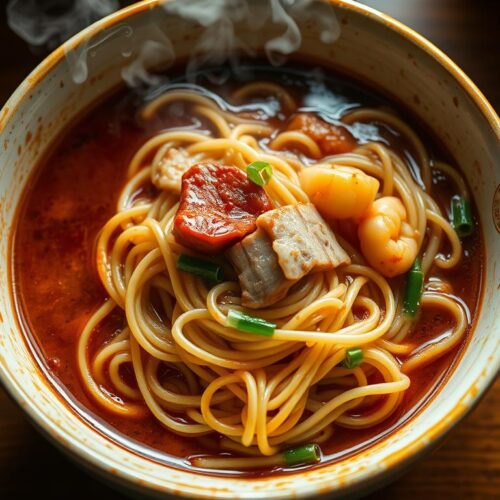
Savor the Flavor: Authentic Hokkien Noodles Recipe
Ingredients
- 14 oz 400 g fresh Hokkien noodles (or thick egg noodles)
- 2 tablespoons vegetable oil
- 3 cloves garlic minced
- ½ lb 225 g pork belly or chicken, thinly sliced
- ½ lb 225 g shrimp, peeled and deveined
- 1 cup Chinese cabbage or bok choy chopped
- ½ cup bean sprouts
- ¼ cup dark soy sauce
- 2 tablespoons light soy sauce
- 1 tablespoon oyster sauce
- 1 teaspoon sugar
- ½ cup chicken broth or water
- White pepper to taste
- Optional: green onions and lime wedges for garnish
Instructions
- Rinse and loosen the Hokkien noodles under warm water. Drain and set aside.
- In a wok or large skillet, heat oil over medium-high heat. Add garlic and stir-fry until fragrant.
- Add sliced pork (or chicken) and cook until browned. Add shrimp and stir-fry until pink.
- Toss in the cabbage and bean sprouts; cook for 2 minutes until slightly wilted.
- Add the noodles and pour in dark soy sauce, light soy sauce, oyster sauce, sugar, and broth.
- Stir-fry everything together for 3–5 minutes until noodles are well-coated and heated through.
- Season with white pepper to taste.
- Garnish with green onions and serve hot with lime wedges if desired.
